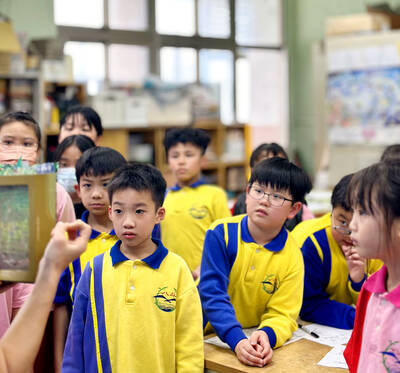Adrama from the hand of Cherien Dabis, first released in 2009 but took its time negotiating the festival circuit before making it to Taiwan. That wait is worthwhile, for this excellent film finds a way of dealing with the thorny issue of immigration that manages to avoid the perils of heavy-handed preaching and bleak social realism.
The title of Amreeka is a play on the way some Palestinian immigrants pronounce America, their new home. It is a place that is both more and also very much less than they had often hoped for. The dangers of life in the Palestinian territories and the constant harassment at Israeli checkpoints are replaced by a world in which their status and identity have to be renegotiated at every step. Even among the most friendly of hosts, this can be a frustrating business.
The story centers on Muna Farah (Nisreen Faour) and her son Fadi, who win the opportunity to immigrate to the US in a lottery. Muna is not all that keen on leaving the home she loves, but Fadi, at the early stages of rebellious adolescence, is particularly vulnerable in an environment bubbling over with violence. An incident at a checkpoint when Fadi cracks smart at one of the troopers convinces her that getting out is the only way to ensure his safety.

Photo Courtesy of CatchPlay
On arrival in the US, Muna tells a rather confused immigration official that she is from “the Palestinian territory,” and when asked about her occupation, replies, “yes, we are occupied.” Such little snippets of dialogue, in this case between a nervous and anxiously cooperative immigrant and a bored and ignorant official are not only amusing, but also provide a wealth of implications that give this relatively light-hearted drama its depth.
Faour puts in a thoroughly engaging performance as Muna, an intelligent and proud woman constantly wrong-footed by an alien world that doesn’t work the way she expects. Not only can she not find a bank job, for which she is eminently qualified, but is worried by Fadi, whose rebelliousness is aggravated by taunts in school by students armed with jokes about Osama bin Laden and suicide bombers. The irony of the situation is made in a single-line revelation late in the film that the Farahs are not even Muslim, but Palestinian Christians.
Muna’s hesitant steps in the US are juxtaposed against the presence of her sister Raghda Halaby (played by the wonderful Hiam Abbass, who was so crucial to the success of The Visitor, Thomas McCarthy’s 2007 film about immigration). The Halaby’s have been in the US 15 years, but Raghda’s husband, a doctor, has found that after Sept. 11, 2001, his patients have been drifting away from his practice as anti-Arabism seeps into the national mood. Their easy confidence with all things American does not change the fact that they still feel the cold shoulder of a nation that has turned against them.

Photo Courtesy of CatchPlay
The good acting and taut script are the making of Amreeka. This is a film that might easily be criticized for being a little too upbeat, and its ending leaves a rosy afterglow that cynics might sneer at. But Amreeka has a belief in the fundamental goodness of human beings, and if this includes a whiff of romance between Muna and the principal of Fadi’s school, a Polish Jew, so be it.
The toughness of the challenge that faces Muna, especially her struggle with her own conception of self-respect and economic exigencies, is heartrending without ever being melodramatic. If some of the harsher realities of suffering and the ugliness of prejudice are not shown, they can still be felt thrumming with life in the background.

May 26 to June 1 When the Qing Dynasty first took control over many parts of Taiwan in 1684, it roughly continued the Kingdom of Tungning’s administrative borders (see below), setting up one prefecture and three counties. The actual area of control covered today’s Chiayi, Tainan and Kaohsiung. The administrative center was in Taiwan Prefecture, in today’s Tainan. But as Han settlement expanded and due to rebellions and other international incidents, the administrative units became more complex. By the time Taiwan became a province of the Qing in 1887, there were three prefectures, eleven counties, three subprefectures and one directly-administered prefecture, with

It’s an enormous dome of colorful glass, something between the Sistine Chapel and a Marc Chagall fresco. And yet, it’s just a subway station. Formosa Boulevard is the heart of Kaohsiung’s mass transit system. In metro terms, it’s modest: the only transfer station in a network with just two lines. But it’s a landmark nonetheless: a civic space that serves as much more than a point of transit. On a hot Sunday, the corridors and vast halls are filled with a market selling everything from second-hand clothes to toys and house decorations. It’s just one of the many events the station hosts,

Two moves show Taichung Mayor Lu Shiow-yen (盧秀燕) is gunning for Chinese Nationalist Party (KMT) party chair and the 2028 presidential election. Technically, these are not yet “officially” official, but by the rules of Taiwan politics, she is now on the dance floor. Earlier this month Lu confirmed in an interview in Japan’s Nikkei that she was considering running for KMT chair. This is not new news, but according to reports from her camp she previously was still considering the case for and against running. By choosing a respected, international news outlet, she declared it to the world. While the outside world

Through art and storytelling, La Benida Hui empowers children to become environmental heroes, using everything from SpongeBob to microorganisms to reimagine their relationship with nature. “I tell the students that they have superpowers. It needs to be emphasized that their choices can make a difference,” says Hui, an environmental artist and education specialist. For her second year as Badou Elementary’s artist in residence, Hui leads creative lessons on environmental protection, where students reflect on their relationship with nature and transform beach waste into artworks. Standing in lush green hills overlooking the ocean with land extending into the intertidal zone, the school in Keelung